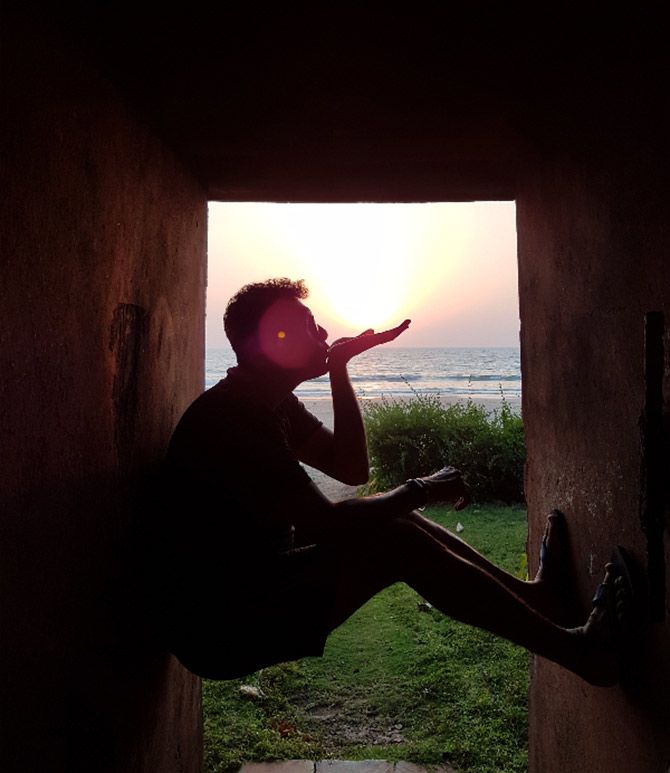Our busy schedules, our living conditions where sunlight is often a luxury, pollution as also social mores that frown upon exposure are collectively responsible, says Veenu Sandhu.

IMAGE: Television actress Sonarika Bhadoria soaks in Vitamin D. Photograph: Kind courtesy Sonarika Bhadoria/Instagram
In 2016, rapper Baba Sehgal released a song that was wacky even by his standards. He called it Vitamin D. It went something like this:
Go go go go go go outside
Kholo apni eyes wide
Sun bole lelo Vitamin D ki ride.
The gist of it was: Step outside; open your eyes wide; the sun's inviting you to take a Vitamin D ride.
Sehgal's songs aren't something one would ordinarily take seriously. But, this time around, the rapper was, in his own way, drawing attention to a serious issue: Vitamin D deficiency, which, if researches and doctors are to be believed, is assuming epidemic proportions, not just in India but even in the West.
The International Osteoporosis Foundation estimates that 80 per cent of people across urban India suffer from Vitamin D deficiency.
The normal range, according to the way it is measured in India, is 75 to 185 nanomoles per litre.
Some pathology labs consider the normal upper range to be 200 nanomoles per litre.
"I find an increasing number of people who come to me with aches and pains to be deficient in this vitamin that is vital for calcium absorption as well as bone and muscle strength," says Dr Aashish Chaudhry, senior consultant (orthopaedics) and managing director, Aakash Healthcare, New Delhi.
The orthopaedic says that, at one point, his own Vitamin D level had plunged to 13.
A Vitamin D deficiency is ordinarily understood to impact women, especially those who are pregnant or are menopausal, or older people. But doctors are now observing a much wider population, including men and 20- to 30-year-olds, suffering from the deficiency.
"I find it even in children as young as six months old because the concept of giving the baby an oil massage while sitting out in the sun has practically died," says Dr Chaudhry.
In its most natural form, humans, like animals, receive the required daily dose of Vitamin D from exposure to the sun -- that too, the morning sun, between 7 am and 1 pm.
To get optimal doses, you need to sun yourself for at least half an hour with 40 per cent of your body exposed.
Despite living under the glare of the tropical sun, that rarely happens.
Our busy schedules, our living conditions where sunlight is often a luxury, pollution as also social mores that frown upon exposure are collectively responsible.
The melanin pigment in the Indian skin, which gives it a brown colour, also makes Vitamin D absorption difficult.
What's more, unless a person has visible signs of the deficiency, such as weak bones, osteoporosis or is of advanced age, the problem is likely to go undetected.
In children, you will see visible, and sometimes alarming, signs such as stunted growth, weak bones or a large skull.
"These are signs you cannot miss," says Dr Chaudhry. "But, as adults, we tend to think that the weakness or stiffness is because of lack of exercise."

IMAGE: Rediff Reader Aalap Sharma plays with the sun's light in Goa. Photograph: Kind courtesy Aalap Sharma
Several doctors have now routinely starting prescribing the Vitamin D 3 test for those they think might be deficient and are even recommending Vitamin D supplements.
This has happened particularly after the Indian Medical Association felt the need to sensitise doctors to the issue and raise awareness about Vitamin D deficiency in the Indian population.
The IMA did so through 'Rise & Shine," a D-deficiency awareness initiative.
There are reasons for the concern.
Often underrated and little understood, Vitamin D performs crucial functions.
Besides being critical for bone and muscle strength, because it is necessary for calcium absorption, it also impacts energy levels, cardiovascular health, brain functioning, fertility and the synthesis of red blood cells, which are the body's warriors against diseases. So, it also builds immunity.
A simple blood test called calcifediol, or 25-hydroxy Vitamin D, is used to determine how much Vitamin D there is in the body.
Some doctors, especially endocrinologists, may recommend the more expensive 125-dihydroxy Vitamin D3 test.
This is to check the active form of Vitamin D, which is in fact a hormone produced after Vitamin D has been 'activated' in the kidney.
This test is, however, not always needed. The 25-hydroxy Vitamin D usually suffices.
In the event of a deficiency, the doctor will prescribe a supplement because there is simply no other way of topping up the Vitamin D in the body.
Vegetables and milk don't give you any Vitamin D.
There are some foods such as salmon and egg yolk that do contain the vitamin, but the quantity is not enough to meet the daily need.
An egg, for example, contains barely 40 to 50 units of Vitamin D whereas the daily requirement is between 600 and 1,000 units.
Supplements come in different dosages as chewable tablets, sachets, capsules and also in liquid form.
As with medicines, these supplements should not be consumed without consulting a doctor. That's because, although rare, a Vitamin D overdose, or toxicity, can be as -- if not more -- dangerous as its deficiency.
Vitamin D toxicity causes a buildup of calcium, or hypercalcemia, in the blood stream.
Its symptoms include vomiting, nausea, stomach pain, constipation, diarrhoea, fatigue, dizziness and confusion. It can affect the liver, heart and brain.
What's more, too much Vitamin D is detrimental to bone health, leading to bone loss.
In extreme conditions, it can damage the kidneys.

IMAGE: Even the Gods soak in the sun. Rediff Reader Nitin Patil took this picture at Deskit Gompa, Nubra Valley, Ladakh.
However, given the high prevalence of its deficiency, there is one view that some foods such as milk and cheese should be fortified with Vitamin D.
A chocolate health drink aimed at children has, in fact, come up with a Vitamin D-fortified version.
Dr Chaudhry is for a top-down approach in the matter where he feels that "the government needs to intervene," the way it did when iodine deficiency became a serious problem in India.
"Today, you have iodised salt and fewer cases of iodine deficiency," he says, adding that countries such as Hong Kong, the US and the UK have Vitamin D-fortified products such as milk and cheese that can be bought off the shelf.
Shikha Sharma, founder of NutriHealth in Delhi, is, however, sceptical about adding the vitamin to everyday food items.
"I am anti-fortification of normal food. Then people will be oblivious to their Vitamin D intake and could touch dangerous levels," she says.
"Instead, fortify something that is obvious."
There are also stories of people reporting excessive levels of the vitamin in their body after taking a supplement.
"That is bound to happen if you get a test done a day or two after taking the supplement," says Dr Chaudhry. "Wait for four to six weeks after the last dose of the vitamin before repeating the test."
Though it is being talked about today like never before, Vitamin D has the medical community divided.
The right dose, the right duration of that dose and the right test -- many of these are questions that are still being answered.











